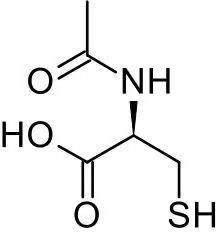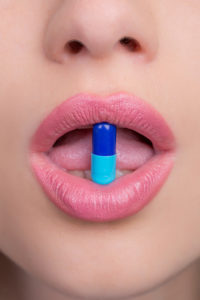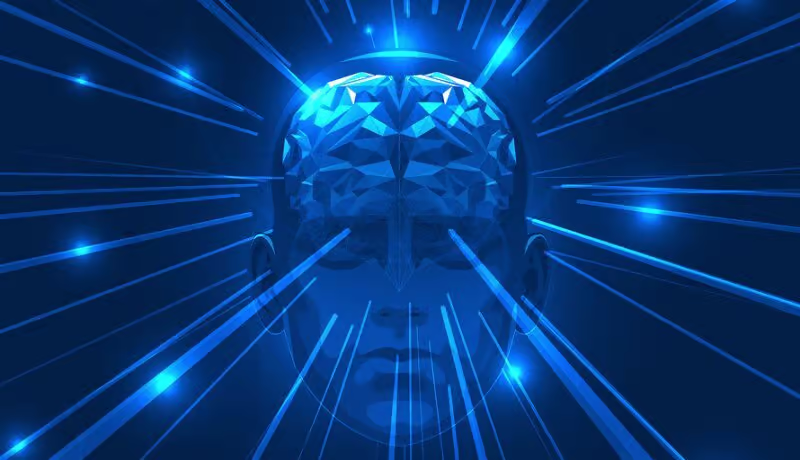Table of Contents
Key Takeaways
- N-Acetyl L-Cysteine (NAC) is a powerful antioxidant that restores glutathione levels in the body and brain, helping maintain oxidative balance in cells.
- NAC has neuroprotective properties, reducing inflammation, oxidative damage, and modulating glutamate levels and dopamine release, positively impacting cognition, memory, and mood.
- NAC shows potential in treating serious cognitive disorders like schizophrenia, bipolar disorder, severe depression, and anxiety by boosting glutathione and dopamine levels in the brain.
- NAC can reduce oxidative stress, eliminate free radicals, rejuvenate dopamine receptors, and enhance cognitive function when taken as a supplement.
- N-Acetyl L-Cysteine (NAC) dosage recommendation is 500 mg, 3-times per day
N-Acetyl L-Cysteine (NAC or N-acetylcysteine) is the N-acetyl derivative of the naturally occurring amino acid L-cysteine. And works primarily by helping restore the body’s natural antioxidant glutathione (γ-glutamylcysteinylglycine; GSH).
As the most abundant antioxidant in your body, GSH is responsible for maintaining oxidative balance in each of your cells.
I have been using 500 mg NAC 3-times per day and every day for the last decade and it is one of my favorite supplements.
Taking glutathione as a nootropic supplement does not adequately restore GSH levels in your brain because it can’t cross the blood-brain barrier. This vastly underrated nootropic, NAC easily penetrates the blood-brain barrier and raises glutathione levels in your brain.[i]
NAC has been used to treat acetaminophen poisoning for decades.[ii] Every year there are 56,000 ER visits from Tylenol overdose, resulting in at least 100 deaths. [iii] NAC provides the glutathione your liver needs to fight off the metabolite NAPQI in Tylenol that does severe liver damage.
Studies show that as a nootropic, NAC helps prevent glutamate toxicity, boosts dopamine, and reduces inflammation, oxidative and free radical damage.
Where to buy: one of the only vendors still selling NAC and I highly recommend them: Life Extension – NAC
N-Acetyl L-Cysteine helps:
- Neuroprotection. NAC as a precursor of glutathione, is a potent antioxidant, anti-inflammatory and free radical scavenger.[iv] Your brain is especially vulnerable to inflammation, free radical and oxidative damage. Affecting cognition, long-term potentiation, memory and mood.
- Neurotransmitters. NAC modulates glutamate levels and dopamine release in the brain. Excess glutamate in your brain is toxic to brain cells affecting neuron health, cognition, memory and mood. And NAC protects dopamine receptors. Influencing dopamine levels and function in your brain. Even protecting dopaminergic nerve terminals from chronic methamphetamine use.[v]
- Anxiety and depression. NAC reduces irritability, anxiety and depression. NAC increases your body’s antioxidant capacity, and balances excitatory and inhibitory neurotransmitters in your brain. Resulting in less anxiety and depression.
N-Acetyl L-Cysteine (NAC)
N-Acetyl L-Cysteine (NAC) is the N-acetyl form of the naturally occurring amino acid L-Cysteine.

L-Cysteine is naturally produced in your body using the amino acid methionine. You can also get L-Cysteine from eating ricotta and cottage cheese, yogurt, pork, chicken, turkey, duck, wheat germ, granola and oat flakes.
But acute stress, illness, or a poor diet can deplete L-Cysteine levels in your body and brain. The quickest and most efficient way to boost levels of L-Cysteine is to supplement with N-Acetyl L-Cysteine (NAC).
NAC regulates the amount of glutamate in your brain. Glutamate is a neurotransmitter that is responsible for sending signals between neurons in the brain. This plays an important role in learning and forming memories.
But too much glutamate can be toxic to brain cells. NAC regulates the amount of glutamate and keeps it at safe, healthy levels.
NAC influences the amount of dopamine available in your brain. It works to keep dopamine receptors healthy and able to transmit and receive dopamine. These neurotransmitters are crucial for cognitive energy and drive, motor control, feelings of pleasure, and focus.
NAC is a precursor to the powerful anti-oxidant glutathione (GSH). GSH is a potent anti-inflammatory, anti-oxidant and free radical scavenger.
Your brain is especially vulnerable to inflammation, free radical and oxidative damage. If left unchecked, inflammation, oxidation and free radicals can negatively affect cognition, long-term potentiation, memory and mood.
As a nootropic, NAC can boost glutathione and dopamine levels in your brain. NAC is also used by medical professionals to treat serious cognitive disorders like schizophrenia, bipolar disorder, severe depression and anxiety.
How does N-Acetyl L-Cysteine work in the Brain?
N-Acetyl L-Cysteine boosts brain health and function in several ways. But two in particular stand out.
- N-Acetyl L-Cysteine reduces oxidative stress. Oxidative stress is caused by free radical damage in brain immune cells. Leading to neurodegeneration and reducing brain health which can lead to Alzheimer’s, Parkinson’s and other age-related neuronal disorders. Proteins and DNA are injured, inflammation, tissue damage and cellular apoptosis (cell death) are the result.
And neurohackers are not immune to oxidative stress no matter what your age. Keep this in mind the next time you reach for a Diet Coke. Consumption of the artificial sweetener aspartame induces cortical inflammation and oxidative stress. And negatively affecting brain health.
Researchers did a study with 30 adult male Wistar rats randomly divided into 3 groups. The control group received distilled water. The second group was given aspartame. And the third group was given aspartame and NAC. Oral administration was done in the morning daily for 90 days.
The study found that NAC boosted Brain-Derived Neurotrophic Factor (BDNF) levels, blocked the COX-2 and PGE2 inflammatory enzymes, and reduced the expression of interleukin-6 (IL-6) and tumor necrosis factor-α (TNF-α) inflammatory cytokines in the rat cerebral cortex. They also found that NAC replenished glutathione levels.
The researchers concluded that NAC prevented neurotoxicity and improved neurological function, suppressed brain inflammation, and oxidative stress response.[vi]
- NAC relieves depression. Major depressive disorder is one of the most common psychiatric disorders. It’s a burden on the individual, family and the community. And the pharmaceutical companies are making literally billions on selling various anti-depressants. Not treating the cause, producing a host of side effects, and in most cases just ‘dumbing down’ the symptoms.
But the pipeline for new anti-depressant drug discovery is at a near stand-still for treating problems like schizophrenia, bipolar disorder, depression and common forms of autism.
The good news is that neuroscience continues to work on the problem. And have shown that many of these disorders share immune health issues such as inflammation and oxidative stress as part of their disease physiology.
Neuroscientists also discovered that associated pathways causing these diseases include a reduction in proteins that stimulate neuron growth (neurotrophins), increased apoptosis (cell death), and reduced energy generation in mitochondria.
It turns out that N-Acetyl Cysteine seems to have multiple effects on all these pathways. NAC reduces the core symptoms of schizophrenia, reduces depression, and reduces cravings for a number of addictions including cocaine, cannabis and tobacco.[vii]
How things go bad
As we get older or suffer from chronic illness, our brain and body chemistry and energy metabolism changes.
↑ Oxidative stress in brain cells increase
↓ Free radicals damage neurons
↓ Dopamine receptors stop working
↑ Glutamate toxicity causes cell damage and apoptosis
↓ Brain-Derived Neurotrophic Factor (BDNF) declines
↓ Mitochondria energy declines
All of these changes are often attributed to chronic illness, lifestyle choices, and aging.
Unchecked, they could lead to neurodegenerative diseases like Parkinson’s, Alzheimer’s, major depression, schizophrenia, OCD, addictions, autism, and a drop in quality of life.
N-Acetyl L-Cysteine health benefits
N-Acetyl L-Cysteine (NAC) is a slightly modified version of the sulfur-containing amino acid L-Cysteine. When taken as a supplement, NAC can reduce oxidative stress by replenishing intracellular levels of the natural antioxidant glutathione (GSH). Restoring your cells’ ability to fight damage from reactive oxygen species (ROS).
Conventional medicine has used NAC for decades as an inhaled mucous thinner to treat symptoms of cystic fibrosis. Patients receive intravenous NAC (IV) or orally as a treatment for acute acetaminophen overdose poisoning. NAC quickly restores glutathione levels, averting permanent disability or death.
The nootropics community has recently discovered NAC as a way to suppress inflammation in the brain. NAC prevents oxidative stress on brain cells, eliminates free radicals, restores Brain-Derived Neurotrophic Factor (BDNF), rejuvenates dopamine receptors, and improves overall cognitive function.
NAC can help boost cognition, Long-Term Potentiation for long-term memory formation, short-term and working memory, improve your mood and quell anxiety.
How does N-Acetyl L-Cysteine feel?
Neurohackers report that supplementing with NAC could be the best nootropic they’ve ever used for their brain and overall health. Comments include:
- Thinking is clearer (less brain fog)

- Memory improves
- Concentration and attention improves
- Less anxiety
- Less depression
- Less irritable
- Mood improves (like a ‘clean high’)
- Symptoms caused by ADHD meds disappear
- Obsessive Compulsive behavior decreases
- Sleep quality improves
- Energy levels increase
- Weight maintenance is easier
- Less flu and colds
- Skin looks better
- Feel younger
- Hangovers are less severe
N-Acetyl L-Cysteine Clinical Research
N-Acetyl L-Cysteine increases dopamine in Parkinson’s Disease
Treatments for Parkinson’s Disease are limited to replacing dopamine in the brain. As well as some medications designed to slow down the disease.
In 2016, researchers at Thomas Jefferson University showed that oxidative stress in the brain could play a critical role in the progression of Parkinson’s. And this stress lowers levels of glutathione, a compound produced in the brain to counteract oxidative stress.
Studies show that N-Acetyl L-Cysteine (NAC) helps reduce oxidative damage to neurons by helping restore the levels of the antioxidant glutathione.
In this study, Parkinson’s patients were placed into two groups. The first group received 50 mg/kg of an intravenous n acetyl cysteine (IV) once per week. And 600 mg of NAC as a supplement twice a day on non-IV days.
The second (control) group received only their standard Parkinson’s treatment. Patients were evaluated at the beginning of the study and again 3 months later.
The evaluation consisted of the Unified Parkinson’s Disease Rating Scale (UPDRS), and a SPECT brain scan which measures the amount of dopamine transporter in the brain.
Compared to controls, the patients receiving NAC had significant improvements in their scores. One of the study authors said, “We have not previously seen an intervention for Parkinson’s disease have this kind of effect on the brain”. This study demonstrated for the first time the direct effect of NAC on the brain’s dopamine system. NAC has the unique ability to enable dopamine neurons to recover their function.[viii]
N Acetyl Cysteine (NAC) alleviates symptoms related to Chronic Obstructive Lung Disease
People suffering from chronic obstructive pulmonary disease (COPD) may experience long-term oxidative damage and inflammation of lung tissue. And lack of oxygen to the brain can have a severe impact on memory.
In addition, any chronic lung disease, such as bronchitis, can cause airways to constrict. This inflammation may lead to shortness of breath or coughing. Research suggests that taking the potent antioxidant N-Acetyl Cysteine (NAC), dietary supplements can help improve symptoms related to COPD, chronic bronchitis, and its complications, and improve lung function.
N-Acetyl L-Cysteine repairs Traumatic Brain Injury
Traumatic brain injury (TBI) is a major public health issue affecting 69 million people worldwide each year.[ix] TBI can be caused by sports injuries, work accidents, car and motorcycle accidents, falls, and your wife hitting you over the head with a frying pan.
Many survivors end up with long-term or even permanent neurocognitive dysfunction. Affecting cognition, motor function (movement) and personality. These disabilities are estimated to cost $26 billion in lifetime medical costs and $631 billion in quality of life lost.[x]
A major cause of TBI comes from blast exposure on the battlefield. Symptoms are similar to other causes of TBI; dizziness, hearing loss, headache, memory loss, sleep issues, and neurocognitive dysfunction.
In a brain subjected to TBI there is glutamate toxicity, free-radical injury to brain cells, electrolyte imbalances, mitochondrial dysfunction, inflammation, apoptosis (cell death) and stroke.[xi][xii]
This double blind, placebo-controlled study was conducted with 81 active duty service members at a forward deployed field hospital in Iraq. All service members in this study were exposed to significant ordinance blast and met the criteria for TBI.
Service members were randomly assigned to receive either a placebo or N-Acetyl L-Cysteine (NAC) for 7 days. The resolution after 7 days of all the TBI symptoms listed above was the main outcome measure of this study.
The researchers concluded that NAC was a safe pharmaceutical countermeasure of blast-induced TBI. And that further work on long term outcomes and the potential use of NAC in civilian TBI is warranted.[xiii]
N-Acetyl L-Cysteine helps alleviate depression
Both depression and bipolar disorder are complicated by glutathione depletion. The researchers in this double-blind, multicenter, placebo-controlled study worked with 75 subjects with bipolar disorder.
Subjects received 1 gram of NAC twice daily for 24 weeks. NAC treatment caused a significant improvement with depression with those using NAC.
The researchers concluded, “NAC appears a safe and effective augmentation strategy for depressive symptoms”. In this case with people suffering from bipolar disorder.[xiv]
N-Acetyl L-Cysteine Recommended Dosage
 N-Acetyl L-Cysteine (NAC) suggested dosage for cognitive benefit is 500 mg 3-times per day.
N-Acetyl L-Cysteine (NAC) suggested dosage for cognitive benefit is 500 mg 3-times per day.
Clinical studies have found that doses up to 2,000 mg per day are safe and effective.
And one German study showed the safety of 2,800 mg per day for 3 months in patients with cystic fibrosis.[xv]
NAC has also proven effective against seasonal influenza and flu-like illnesses. One large study of older adults in Italy took 600 mg of NAC twice daily for 6 months. Only 25% of those adults who used NAC experienced flu-like episodes compared to 79% in the placebo group.[xvi]
N-Acetyl L-Cysteine Side Effects
N-Acetyl L-Cysteine (NAC) is the N-acetyl form of one of the naturally occurring amino acids of the body, L-Cysteine.
NAC is a slightly modified version of the sulfur-containing amino acid L-Cysteine. So NAC in powder form can have an unpleasant smell.
Very rarely can NAC cause nausea, vomiting, diarrhea or constipation. Even more rare are rashes, fever, headache, drowsiness, low blood pressure and liver problems.
Side effects can be a result of very high doses of NAC. And if you have a genetic condition called Cystinuria do not use NAC. This rare condition causes stones to form in the kidneys, ureter and bladder from cysteine. NAC is the N-Acetyl form of Cysteine.
One study has also found that long-term use of high-dose NAC can deplete your body’s stores of zinc. So if you are using NAC everyday you should also supplement with zinc and low dose copper.
Where to buy N-Acetyl L-Cysteine
N-Acetyl L-Cysteine (NAC) is available in powder, tablet and capsule form. NAC capsules and tablets were usually 500 mg.
Where to buy: I highly recommend: Life Extension – NAC
NAC was in short supply because on July 23, 2020, the FDA sent a warning letter to Purple Biosciences LLC about its NAC product. And asserted that NAC was illegally sold as a dietary supplement because it was approved as a drug September 14, 1963. Several other letters were sent to supplement manufacturers. Resulting in NAC being difficult to find on Amazon or many of the other sites that used to sell NAC.
Several lawsuits were filed against the FDA. And NAC has since become easier to find in the supplements sections of online stores.
Nootropics Expert Recommendation
N-Acetyl L-Cysteine (NAC) 500 mg, 3-times per day
 I highly recommend using N-Acetyl L-Cysteine (NAC) as a nootropic supplement.
I highly recommend using N-Acetyl L-Cysteine (NAC) as a nootropic supplement.
Your body does synthesize some L-Cysteine from methionine. And you can get L-Cysteine from foods such as dairy, poultry, pork, and some grains and nuts.
But most of us don’t get enough N-Acetyl L-Cysteine from our diet. So supplementation will help. And N-Acetyl L-Cysteine is a highly bioavailable form of L-Cysteine. So you should feel its effects faster.
NAC is helpful for most neurohackers to improve mood, memory, cognition, and concentration. And NAC helps alleviate brain fog, anxiety, and irritability.
NAC is especially helpful to those dealing with Obsessive Compulsive Disorder. And stacked with ADHD meds, NAC helps alleviate some of the negative side effects associated with stimulants.
If you can still find it, you can safely use up to 1,800 mg of NAC per day. The usual dose for cognitive improvement is 500 mg dosed 3 times throughout your day.
I recommend N-Acetyl L-Cysteine (NAC) from : Life Extension – NAC








Join The Discussion - 576 comments
Yentl
February 17, 2023
Hey David,
I’m a little worried about this…
Been using NAC and been feeling emotionally numbed and depressed. Like no pleasure from activities, low motivation, lack of excitement, etc
Seen on the internet from other sources and websites that NAC could potentially cause anhedonia and emotional numbing.
What’s your experience with this?
Can I still take it.
Same is said about some herbs such as ashwaghanda and the such.
Perhaps it’s best taken in the evening?
It’s also said NAC chelates metals such as copper, iron and zinc which may be the cause of the numbing effect what do you think?
Thank you,
Yentl
David Tomen
February 17, 2023
Yentl, if that is how you respond to NAC then it is the wrong supplement for you. How you respond may be different that how others feel when using this supplement. There are several different reasons why this could happen which are not worth going in to. I suggest you just avoid using NAC.
Ashwagandha affects thyroid hormone which can cause problems with someone using thyroid medication.
Lauren
February 2, 2023
Hi, I started taking NAC (which also contains Selenium and Molybdenum) to try and help with anxiety/low mood etc, I feel absolutely fine mentally on the tablets but I feel like my muscles ache after work like I have lactic acid build up; but I’m confused as I thought NAC actually helped with fatigue from exercise? Am I supposed to take something with it or am I missing something? Many thanks Lauren
David Tomen
February 3, 2023
Lauren, you are not ‘missing’ anything. It could be that NAC is simply the wrong supplement for you.
Okiwaso
January 31, 2023
Be careful with NAC as it has cytoprotective effects, but they are not specific to healthy cells. Meaning, a cancer cell targeted for destruction by your immune cells could be rescued by NAC supplementation.
https://pubmed.ncbi.nlm.nih.gov/7664840/
NAC seems to block mitochondrial apoptosis indiscriminately by preventing an important apoptotic redox signal
https://www.ncbi.nlm.nih.gov/pmc/articles/PMC9096398/
So I would not take it long-term, and maybe just use it as a treatment for Covid-19 as it was found to inhibit proinflammatory cytokines, hypercoagulation & improve T cell response
Also was found to weaken the binding affinity of S-protein with ACE2
https://chemrxiv.org/engage/chemrxiv/article-details/60c753ec4c89190f3bad43ca
David Tomen
February 1, 2023
Okiwaso, you are cherry picking from clinical studies to make your point and you are wrong. The first two studies you point to are testing Berberine to kill prostate cancer cells through an increase in Reactive Oxygen Species (ROS). NAC, which is a potent antioxidant prevented Berberine from doing its job.
The researchers were using NAC in these studies to prove their theory that Berberine helps kill prostate cancer cells through increasing ROS. No where in those studies do the researchers say using NAC daily is dangerous. Because for most people it is not.
But you were correct in pointing out the benefits of using NAC to deal with COVID-19 infection.
Alex
January 18, 2023
Hi David, just thought I would let you know that this article states that NAC cannot be sold on Amazon, but recently NAC has been available on Amazon. I don’t know about other sites that discontinued the sale of NAC, but you can now buy NAC on Amazon, so it may be useful to update the article about that. Great article by the way!
David Tomen
January 18, 2023
Thanks Alex. I’ll update the buy section above this afternoon.
aslı
January 10, 2023
David Hi,
I started using NAC for anxiety and PTSD and I feel very calm, actually too much calm that there is sense of loosing interest of anything and it makes avoidance easier. Do you think adding 5htp or piracetam would do any better?
Thank you again
David Tomen
January 13, 2023
Asli, reduce your dose of NAC. If you still get those side effects and you do not like them then maybe NAC is the wrong supplement for you.
Antje
January 6, 2023
Hello David,
Thank you for all the information you have researched and compiled here.
Would you be able to tell me, if NAC interferes with Doxycycline?
I’m currently taking 100mg Doxycycline once a day for sinusitis-pharyngitis and would like to take NAC four times a day between meals as I understand it helps liquefy phlegm. But I am not sure, if NAC might affect the absorption or effectiveness of the antibiotic.
Kind regards
David Tomen
January 10, 2023
Antje, not according to this list: https://www.drugs.com/drug-interactions/doxycycline-index.html
Jatin
January 4, 2023
Hi David,
Can we take NAC after a meal? It gives me burning sensation for about 30minutes if I take it on an empty stomach.
Also, does it increase bad cholesterol in our body?
Thanks.
David Tomen
January 5, 2023
Jatin, take NAC after a meal if you need to because it’ll still work. And no, NAC does not increase “bad cholesterol”.
Michaela
December 27, 2022
Hi, I’ve been taking NAC off and on for a few months now to help with concentration and brain fog. I’ve found it really helps lift my mood, think straight, and I weirdly have amazing and vivid dreams when I use it.
However, I am extremely sensitive to all drugs/supplements and I’ve found that after I take it for a couple days and then stop it, I experience severe brain fog that is worse than what was there before I took it.
Do you have any suggestions for avoiding or managing this “backlash” effect? I don’t want to take a supplement regularly if my body is just going to habituate to it anyway, or begins to depend on it to function normally.
Thanks!
David Tomen
December 28, 2022
Michaela, if you found something that works then don’t stop! Your body absolutely does not “habituate” to these supplements. It uses them as long as you provide them. I found what works for me years ago and use the same supplements 3-times per day and every day since then. I let you be the judge of the results of that regimen. 🙂